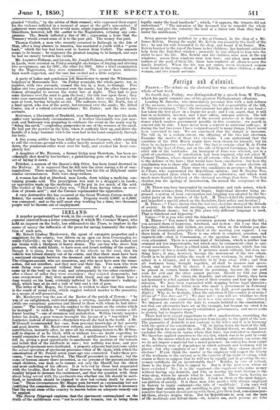IRELAND.
A murder perpetratedlast week, in the county of Armagh, has acquired especial interestfroma letter coneerning it which Mr. Coroner Magee, who het& an inquest on the body, has addressed to the Tinter' to implore in the name of mercy the influence of the press for saving humanity the repeti-
tion-of such acts.. -
Mr. Robert Lindsay Mauleverer, the agent of extensive properties and a msgeslrate for the :county, was driven on an open car from Crossmaglee to- ws Callaville; an the way, he was attacked by two men, who d..whcA. out WA- brains with a bludgeon or heavy stones. The car-boy who drove him pt asses, with *Aid falsity, to have-seen and „heard nothing of the matter -, though it is plain, from the marks of his wheels on the road, that his vehicle was turned sharply oat of its course, and that there must have been a continued struggle between the deceased and his murderers on the road. The villagers around, who are numerous, and who must have seen the trans- action, did not interfere, and they now sealtheir lips. Two men who were seen flying were pursued withosst their aid, first by a constable who came up to the body on the road, and subsequently by two other constables : after a chace of miles they were overtaken ; they resisted desperately, but wee overpowered : they were spotted with blood, and one 'of them bore a deep wound on his head, evidently inflicted by Mr. Mauleverer's walking- stick, .which bare at its end a tuft of hair and a clot of gore. Idle letter of Mr. Magee, the Coroner, is written to show that this murder is the result of social evils; whiCh suggest isolated murder to the peasantry as a means of self-preservation. Mr. Mauleverer was the son of the Rector of the parish of Tynan : " he was of an enlightened, aultivated-mind, a retiring, amiable disposition, and (With one exception) .generous and liberal to those with whom he had inter- comm." The exception was his conduct to the tenants on the estates which he-managed : to such he " unhappily thought it necessary to assume a dif- ferent bearing"—one of sternness and malediction. Within twenty minutes before his death, a poor woman besought the favour of a " bog-ticket" for for pence instead of sixpence—fourpenee was all she had in the world. A Mr. McDonnell recommended her case, from personal knowledge of her poverty and good deserts. Mr. Mauleverer refused, and dismissed her with a curse : nevertheless, instantly after he gave all his remaining tickets to Mr. M‘Don- nett to disperse of as he liked, with or without fee—no doubt expecting he would remember the woman just refused. A middleman's lease of property fell in, giving a good opportunity to ameliorate the position of the tenants and better that of the landlords at once ; but nothing was done, and pro- teedizigs of ejectment were instituted. A property adjaeent had just come under the actual operation of ejectment processes—that of Mr. Quin, with which the amiessination of Mr. Powell seven years ago was connected. Under these pro- cesses, " one house was levelled. The Sheriff proceeded to mother ; but the scene of human misery there presented, in the persons of the parents and nine snhall children, was such as to 111:11111111 not only the Sheriff, but the oldest and most unfeeling of his officers. It is believed by those best acquainted with the locality, that the fact of these decrees being executed in the same lomdity helped to increase the excitement, and that the question with those about being served with the ejectments was- whether one life should be sacri- fiood, or hundreds should be eipined to slow but certain death by starva- tion." These circumstances Mr. Magee puts forward as extenuating but not justifying the assassination. He states them because he believes it necessary that the social state of the country be known before an adequate remedy can be applied.
The Newry Telegraph explitas, that the ejectmenta contemplated on the death of the middleman were "not to evict the tenants, but to bring them
legally under the head landlords" ; _which, " it appears, the tenants did not understand." "The intention of the deceased was to remodel the whole property, and give the tenantry the land at a fairer rate than they had it under the middleman."
Seven persons have perished by a fire at Clonmel, in the shop of a Mr. James Kelvin. During the night, Mr. Kelvin was roused by the smell of the fire ; he and his wife descended to the shop, and found it in flames. Mm. Kelvin hurried to the top of the house to her children ; her husband called fbr help from the first-floor window ; presently he was obliged to leap into the street to save his life. Mrs. Kelvin and her children were seen at the top windows; across these windows were iron bars; and when men ascended ladders at the peril of their life, these bars rendered all efforts to save the family fruitless. When the fire was got under, seven blackened corpses were 'found in the room,—those of Mrs. Kelvin, her three children, a shop- woman, and two female servants.


























 Previous page
Previous page